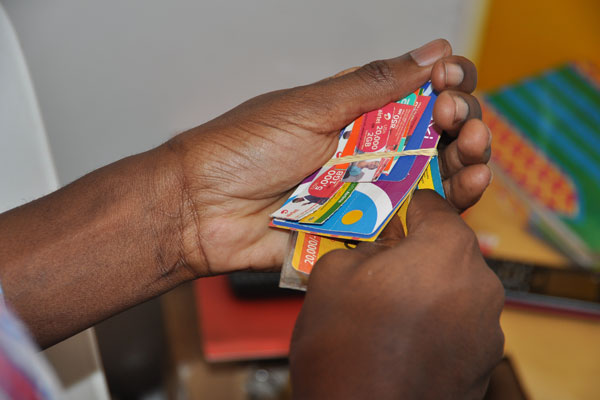Telecommunication companies are preparing for the phase-out of airtime scratch cards so that beginning August 1 they start selling airtime electronically, multiple officials have said.
As the companies prepare for this, there has been a change in the distribution system with some remote areas facing rises in the prices of airtime scratch cards. In some parts of Kampala suburbs, especially trading hubs near homes, the price of airtime has been hiked by 10%.
In Kiwatule, when you are buying airtime from traders with shops along the main road, airtime sales at normal price, but when you branch off from the main road to shops near residences, shopkeepers add in 10% on the normal cost, that is, a Shs500 card will cost you Shs600; Shs2000, will cost you Shs2200 and so on.
The shopkeepers we talked to say they have increased prices because the distributors have also raised the buying price. A shopkeeper, only identified as Jane, said that distributors are telling them that scratch cards are becoming scarce (a thing they are exploiting to raise prices, according to her). She added that they (distributors) now take longer than usual before returning to bring more stock.
Another blame has been that telecoms are the ones raising the price, a thing they have denied. And their position holds some truth since most places are still selling the airtime at a normal price, even upcountry.
Late March of this year, the communications regulator, UCC, banned the sale of scratch cards and halted the issuance of sim cards, saying that some criminal elements were exploiting the unregulated sale of airtime and the casual sim card registration process to commit crimes.
The latter has since been reinstalled with a slightly rigorous process, but how the sale of scratch cards perpetrates crime is still vaguely explained by the government.
“People used to abuse the system of the scratch cards and others would place stolen sim cards to commit crimes. If you want airtime, they will give that which is accountable because we want to know where this airtime was loaded from, here and the other one is loaded at a certain location. We are taking our time to make sure everything is in order,” UCC Executive Director Godfrey Mutabazi has said.
Must Read: [Roundup]: Tech news you could have missed this past week
Telecom operators are, however, happy with the idea since it will reduce their expenditure: There will be no more expenses on shipping scratch and they will be able to make more money since the distribution system will now be directly from the telco to consumer apart from a few individuals who have no mobile money on their phones and they have to use Point of Sale terminals among other airtime distribution options.
Shopkeepers who have been earning some commission from the sale of sim cards say they might abandon the business. “I can’t put my time to loading airtime for a customer on (MTN) Easy Load yet I have other customers waiting to buy goods that are more expensive,” said Annet Nakazzi, who runs a shop in Ntinda. According to Nakazzi, there is no more reason to give time to the airtime selling business yet there are not many returns, especially now that the process is going to be more hectic.
The most affected people will be the fellows who were buying airtime scratch cards from telcos to distribute to shops and other retailers.
Though, there will be no losses made by the dealers since, according to both the dealers and telcos, the latter will be refunded. According to officials, the traders will be asked to return the scratch cards and they will be funded with e-recharge.
It is telecommunication companies that will suffer the losses since, they say, the announcement was on short notice. But, it goes without saying, telcos have multiple ways of recouping this money.
Related:
Airtel, Smile in interconnection dispute over debts
UCC to suspend Africell license over unlawful sale of SIM cards
MTN faces UCC probe amid mobile money storm

